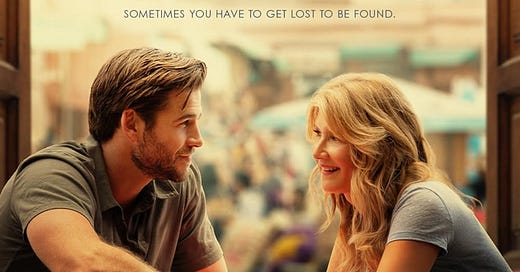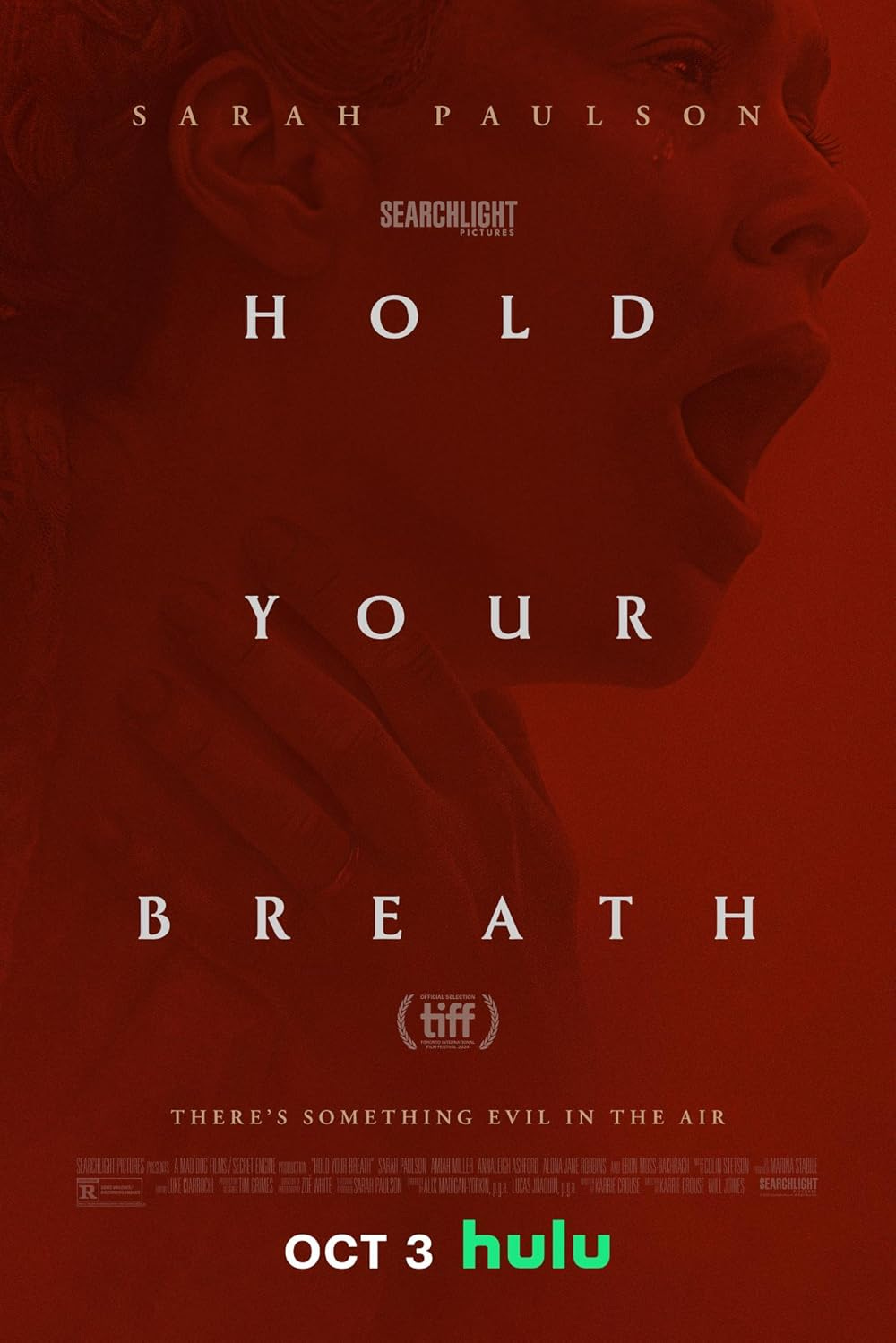Film Review Double Feature: "Lonely Planet," "Hold Your Breath," and the Limits of Star Power
Two recent genre films reveal the extent to which even top-notch performances can't save a film from a slapdash story.
Hello, dear reader! Do you like what you read here at Omnivorous? Do you like reading fun but insightful takes on all things pop culture? Do you like supporting indie writers? If so, then please consider becoming a subscriber and get the newsletter delivered straight to your inbox. There are a number of paid options, but you can also sign up for free! Every little bit helps. Thanks for reading and now, on with the show!
If you know anything about my film consumption habits, you’ll know that I’m one of those people who is drawn primarily to two things: star and story. If you can give me a movie that has compelling performances from stars that I love and a narrative that grabs hold of me and won’t let me go, then I’ll probably consider your project a success. If, on the other hand, one of those elements is missing, the results are almost certainly going to be mixed at best and dreary at work.
This is particularly true when it comes to genre pieces, which really do succeed or fail based almost entirely on how well they’re written–i.e., how adeptly they manage to make use of the tropes of their associated genres–and how strong the central performances manage to be. Two recent films, the romantic drama Lonely Planet and the horror film Hold Your Breath reveal the extent to which weak writing can fatally sabotage what could otherwise be a strong piece of genre storytelling..
We’ll start with Lonely Planet. Like many other gays, I’m a huge fan of Laura Dern, who has given so many masterful performances of powerful women that kick asses and take names. In this film she plays Katherine Loewe, a successful writer who, as a result of some personal setbacks, is experiencing some pretty strong writer’s block and so ends up going to Morocco for a writer’s retreat. Once there she meets Liam Hemsworth’s Owen Brophy, a venture capitalist who’s there with his girlfriend–a newly successful writer–but who feels very much adrift among the literati and finds himself drawn to Katherine. The two strike sparks, and the rest of the film is concerned with the ups and downs of their relationship and, at least secondarily, the dissolution of Owen’s existing relationship.
Now, to be fair to Lonely Planet, the performances are quite strong. While this certainly won’t be seen as one of Dern’s truly extraordinary roles, she still gives it her all, giving us a middle-aged professional woman who is struggling to figure out who she wants to be in the aftermath of a failed relationship. Hemsworth is, likewise, nimble in his performance, and though I’ve always thought he was the weaker of the two big-time Hemsworth siblings, he genuinely won me over here. His Owen might at first seem to be a bit of a bro, but there’s a genuine soul there, too, and Hemsworth succeeds most when he lets the sensitive side take over.
Unfortunately, for all of the strong performances from Dern and Hemsworth–and surprisingly intense chemistry between the two of them–the film never really finds its footing. Much of this, as so often seems to be the case in Hollywood films these days, is simply bad storytelling. The whole premise is skewed from the start, because it is quite unbelievable that a writer, even a newly successful one trying to find her feet, would drag her boyfriend along to a retreat where he was only ever going to feel like an outsider. Diana SIlvers does everything she can to endow her flat character with some depth, but it ultimately doesn’t matter. She’s ultimately nothing more than a plot contrivance, a character that just needs to be an obstruction to the central romance. Sadly, she’s not even that, and it’s hard not to sigh in relief when the two part ways.
The story beats throughout Lonely Planet are all out of whack, so much so that their eventual reconciliation and reunion in the film’s final minutes lands with a deafening thud. I really wanted to like this movie–despite its dismal Rotten Tomatoes score–but unfortunately it was very much a miss for me. It’s one of those films that, on paper, seems like it should work. However, it seems more like something an algorithm spat out rather than a compelling piece of Hollywood storytelling, and that’s truly a shame, because Dern and Hemsworth deserve better.
Hold Your Breath, the horror film directed by Karrie Crouse and Will Joines (the former also wrote the screenplay) is largely more effective in its aims, in that it is a very chilling and disturbing horror flick that’s heavy on atmosphere and leans a lot on Sarah Paulson’s (well-deserved) reputation for being a scream queen. Set in Oklahoma during the Dust Bell, it focuses on Paulson’s Margaret Bellum, a mother who has lost a child and struggles to take care of her two surviving daughters in the midst of ferocious dust storms, an absent husband, and sinister rumors of a murderous drifter.
There’s no denying that it features a great setup. The Dust Bowl was truly a horrifying event in the history of the American Midwest, and dust pneumonia was a very real threat to young and old alike. Moreover, the early parts of Hold Your Breath adeptly capture the encroaching sense of paranoia and isolation that is part and parcel to psychological horror films like this one. The dust storms are terrifying in themselves, of course, but they are even more dreadful when one thinks about what things, whether supernatural or not, might lurk within the darkness. As if all of this weren’t enough to drive a person to madness, there are also rumors that a murderous drifter is on the loose and the dust means that it’s almost impossible to get word out of the village.
So far, so good.
Much of the film’s success is also thanks to Paulson’s magnetic performance. By this point we know that she is truly one of today’s reigning queens of horror, thanks to her long collaboration with Ryan Murphy and her central role in so many seasons of American Horror Story. She brings all of those considerable skills to bear as Mary, a woman who has clearly endured unimaginable heartbreak at the death of a child and must repeatedly face the possibility that one of her two surviving daughters might meet the same fate.
As so often in horror, though, the call is coming from inside the house, and one of the great pleasures of Hold Your Breath is watching Paulson inhabit Mary’s precarious mind as it slowly crumbles under the weight of grief and insomnia and dread. We’re right there with her as her grip on reality slowly starts to slip, so much so that she stabs herself in the leg and proceeds to dab the blood on her cheeks in a macabre sort of blush, before taking the girls to a dance in town. Needless to say the townsfolk are more than a little dismayed by the spreading bloodstain on Mary’s skirts, and thus does her final downfall begin. Even more disturbing is the scene in which she accidentally stitches her sewing into her own flesh, leading to daughter having to cut it out manually. It’s a rare moment of body horror, and it’s just a shame that more wasn’t done with it.
Once again, though, even strong performances and a thoroughly unsettling atmosphere aren’t quite able to make up for a story that has too many holes and underdeveloped plot points for it to ever really make complete and coherent sense. Take, for example, Ebon Moss-Bachrach’s Wallace Grady, the sinister but oddly compelling preacher who makes an unexpected appearance on the farm, claiming to have miraculous powers. Unfortunately the film doesn’t do much with these powers of his, and by the second half he’s all but forgotten, except as yet another projection of Margaret’s declining mental state. This is a shame, because Moss-Bachrach is extraordinary, and one can see how in a more effective screenplay he could have become a much more pronounced and terrifying presence than what he ends up being.
Equally underdeveloped is the Grey Man, a sinister figure that supposedly has the power to control other people’s bodies by infiltrating them in the form of dust. It seems as if this is supposed to be some sort of explanation for Mary’s descent into isolation and madness, but it ultimately feels more like a contrivance than a meaningful plot development. Not even Mary's ailing sister Esther–who miraculously recovers after nearly dying in a dust storm, only to fall into a perilous sort of ennui, only to then again be rejuvenated–is enough to really help this to land. It all just feels rather slapped together, all of which makes the ending even more anticlimactic (I won’t spoil it here, but suffice it to say that Mary’s fate is rather tragic, while her daughters’ is less so).
Sometimes it’s hard to shake the feeling that Hollywood as a whole has sort of lost the plot when it comes to coherent or compelling storytelling. Far too many films are allowed to make it to release when they really should have been sent back for some more finessing of their screenplays. It’s truly unfortunate, because it means that lackluster films that could be something more end up being frustrating experiences for the viewer and, one can’t but think, the actors as well. Surely we all deserve better.





